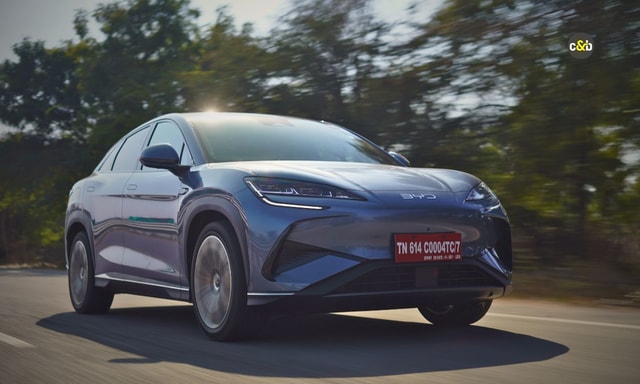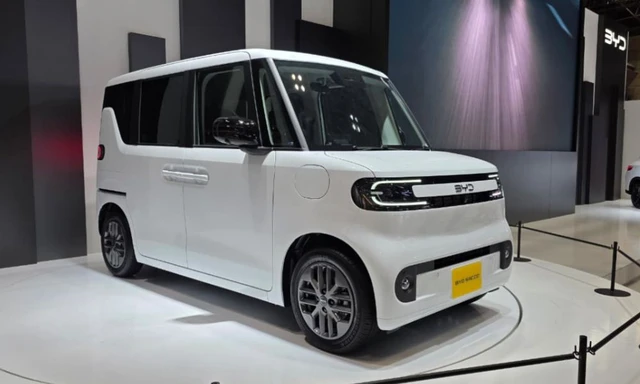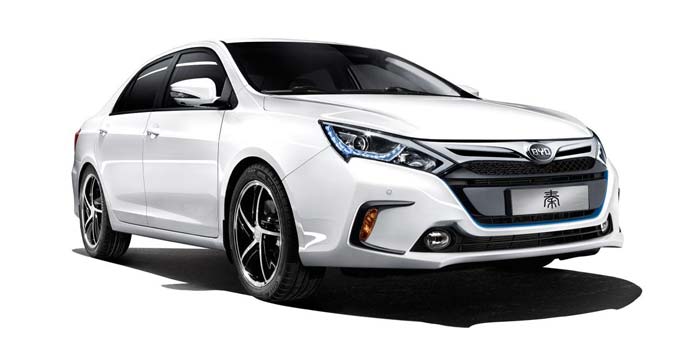Byd Cars

BYD says its Blade battery aims to redefine safety standards for the entire industry. The company says its new generation lithium iron phosphate battery has passed the nail penetration test to achieve high levels of energy density and safety. It's also passed the other extreme test conditions including crushing, bending, heating in a furnace to 300-degrees Celsius and overcharging by 260 per cent. The company says it saw no fires or explosions during the tests.
BYD India offers a total of 8 car models. These consist of 4 BYD upcoming cars and 4 new BYD cars in India. The list of BYD cars in the country comprises 1 sedan car, 2 SUV cars, 1 muv car. The manufacturer offers 12 electric variants. Some of the popular BYD cars in India include BYD Atto 3 EV, BYD Seal, BYD eMAX 7, BYD Sealion 7. As of February 2026, BYD has a total of 14 dealerships spread across 14 cities in India. Check BYD car prices, read BYD car reviews, watch videos, compare BYD cars with cars from other manufacturers and get news alerts from carandbike.com
2026 BYD Car Price List in India
BYD Cars Ex-Showroom Price BYD Atto 3 EV ₹ 28.99 - 39.43 Lakh BYD Seal ₹ 47.6 - 61.75 Lakh BYD eMAX 7 ₹ 31.21 - 34.69 Lakh BYD Sealion 7 ₹ 56.72 - 63.68 Lakh
Byd Car Models and Prices in India
 BYD Sealion 7+2 VariantsMidsize SUV
BYD Sealion 7+2 VariantsMidsize SUV- Electric
- 542 - 567 Km/Fu…
- Automatic
* Ex-Showroom₹ 56.72 - 63.68 LakhEMI starts at₹ 1,17,749EV
 BYD eMAX 7+4 VariantsCompact MPV
BYD eMAX 7+4 VariantsCompact MPV- Electric
- 420 - 530 Km/Fu…
- Automatic
* Ex-Showroom₹ 31.21 - 34.69 LakhEMI starts at₹ 64,778EV
 BYD Seal+3 VariantsPremium Luxury Sedan
BYD Seal+3 VariantsPremium Luxury Sedan- Electric
- 510 - 650 Km/Fu…
- Automatic
* Ex-Showroom₹ 47.6 - 61.75 LakhEMI starts at₹ 98,806EV
 BYD Atto 3 EV+3 VariantsCompact SUV
BYD Atto 3 EV+3 VariantsCompact SUV- Electric
- 468 - 521 Km/Fu…
- Automatic
* Ex-Showroom₹ 28.99 - 39.43 LakhEMI starts at₹ 60,179EV
Upcoming Byd Launches
Byd Electric Cars
 BYD Atto 3 EV+3 Variants
BYD Atto 3 EV+3 Variants- Electric
- 468 - 521 Km/Fu…
* Ex-Showroom₹ 28.99 - 39.43 LakhEMI starts at₹ 60,179Latest ModelEV
 BYD Sealion 7+2 Variants
BYD Sealion 7+2 Variants- Electric
- 542 - 567 Km/Fu…
* Ex-Showroom₹ 56.72 - 63.68 LakhEMI starts at₹ 1,17,749Latest ModelEV
 BYD eMAX 7+4 Variants
BYD eMAX 7+4 Variants- Electric
- 420 - 530 Km/Fu…
* Ex-Showroom₹ 31.21 - 34.69 LakhEMI starts at₹ 64,778Latest ModelEV
 BYD Seal+3 Variants
BYD Seal+3 Variants- Electric
- 510 - 650 Km/Fu…
* Ex-Showroom₹ 47.6 - 61.75 LakhEMI starts at₹ 98,806Latest ModelEV
Popular Byd Cars Comparison

 XEV 9S vs eMAX 7MahindraXEV 9S* Ex-Showroom Price₹ 19.95 - 29.45 LBYDeMAX 7* Ex-Showroom Price₹ 26.9 - 29.9 L
XEV 9S vs eMAX 7MahindraXEV 9S* Ex-Showroom Price₹ 19.95 - 29.45 LBYDeMAX 7* Ex-Showroom Price₹ 26.9 - 29.9 L
 8.1/10Harrier EV vs Atto 3 EVTataHarrier EV* Ex-Showroom Price₹ 21.49 - 30.23 LBYDAtto 3 EV* Ex-Showroom Price₹ 24.99 - 33.99 L
8.1/10Harrier EV vs Atto 3 EVTataHarrier EV* Ex-Showroom Price₹ 21.49 - 30.23 LBYDAtto 3 EV* Ex-Showroom Price₹ 24.99 - 33.99 L 8.1/10
8.1/10 Atto 3 EV vs Windsor EVBYDAtto 3 EV* Ex-Showroom Price₹ 24.99 - 33.99 LMGWindsor EV* Ex-Showroom Price₹ 14 - 17.25 L
Atto 3 EV vs Windsor EVBYDAtto 3 EV* Ex-Showroom Price₹ 24.99 - 33.99 LMGWindsor EV* Ex-Showroom Price₹ 14 - 17.25 L 8.1/10
8.1/10 Atto 3 EV vs Sealion 7BYDAtto 3 EV* Ex-Showroom Price₹ 24.99 - 33.99 LBYDSealion 7* Ex-Showroom Price₹ 48.9 - 54.9 L
Atto 3 EV vs Sealion 7BYDAtto 3 EV* Ex-Showroom Price₹ 24.99 - 33.99 LBYDSealion 7* Ex-Showroom Price₹ 48.9 - 54.9 L
 8.6/10Sealion 7 vs Ioniq 5BYDSealion 7* Ex-Showroom Price₹ 48.9 - 54.9 LHyundaiIoniq 5* Ex-Showroom Price₹ 46.3 L
8.6/10Sealion 7 vs Ioniq 5BYDSealion 7* Ex-Showroom Price₹ 48.9 - 54.9 LHyundaiIoniq 5* Ex-Showroom Price₹ 46.3 L
 XEV 9e vs SealMahindraXEV 9e* Ex-Showroom Price₹ 21.9 - 31.25 LBYDSeal* Ex-Showroom Price₹ 41 - 53.15 L
XEV 9e vs SealMahindraXEV 9e* Ex-Showroom Price₹ 21.9 - 31.25 LBYDSeal* Ex-Showroom Price₹ 41 - 53.15 L
 8.1/10EX30 Recharge vs Atto 3 EVVolvoEX30 Recharge* Ex-Showroom Price₹ 39.99 LBYDAtto 3 EV* Ex-Showroom Price₹ 24.99 - 33.99 L
8.1/10EX30 Recharge vs Atto 3 EVVolvoEX30 Recharge* Ex-Showroom Price₹ 39.99 LBYDAtto 3 EV* Ex-Showroom Price₹ 24.99 - 33.99 L 8.1/10
8.1/10 Atto 3 EV vs Creta EVBYDAtto 3 EV* Ex-Showroom Price₹ 24.99 - 33.99 LHyundaiCreta EV* Ex-Showroom Price₹ 18.02 - 24.55 L
Atto 3 EV vs Creta EVBYDAtto 3 EV* Ex-Showroom Price₹ 24.99 - 33.99 LHyundaiCreta EV* Ex-Showroom Price₹ 18.02 - 24.55 L
 Countryman E vs SealMINICountryman E* Ex-Showroom Price₹ 54.9 - 62 LBYDSeal* Ex-Showroom Price₹ 41 - 53.15 L
Countryman E vs SealMINICountryman E* Ex-Showroom Price₹ 54.9 - 62 LBYDSeal* Ex-Showroom Price₹ 41 - 53.15 L
 8.5/10
8.5/10 7.3/10
7.3/10 8.1/10BE 6e vs Atto 3 EVMahindraBE 6e* Ex-Showroom Price₹ 18.9 - 27.65 LBYDAtto 3 EV* Ex-Showroom Price₹ 24.99 - 33.99 L
8.1/10BE 6e vs Atto 3 EVMahindraBE 6e* Ex-Showroom Price₹ 18.9 - 27.65 LBYDAtto 3 EV* Ex-Showroom Price₹ 24.99 - 33.99 L 8.1/10
8.1/10 Atto 3 EV vs eMAX 7BYDAtto 3 EV* Ex-Showroom Price₹ 24.99 - 33.99 LBYDeMAX 7* Ex-Showroom Price₹ 26.9 - 29.9 L
Atto 3 EV vs eMAX 7BYDAtto 3 EV* Ex-Showroom Price₹ 24.99 - 33.99 LBYDeMAX 7* Ex-Showroom Price₹ 26.9 - 29.9 L
Byd Cars Images
Byd Latest News & Expert Reviews
 Jafar Rizvi | Feb 10, 2026BYD Atto 3 Evo Unveiled: 443 Bhp AWD EV With Up To 470 KM RangeBYD adds a second motor to the Atto 3, bumping torque to 560 Nm while the FWD standard model switches to RWD.1 min read
Jafar Rizvi | Feb 10, 2026BYD Atto 3 Evo Unveiled: 443 Bhp AWD EV With Up To 470 KM RangeBYD adds a second motor to the Atto 3, bumping torque to 560 Nm while the FWD standard model switches to RWD.1 min read Hansaj Kukreti | Jan 2, 2026BYD Sealion 7 Electric SUV Price Hiked By Rs 50,000BYD has increased the price of the Sealion 7 Premium by ₹50,000, effective January 1, 2026, taking it to ₹49.40 lakh; pricing for the Performance variant remains unchanged at ₹54.9 lakh, while existing bookings made before December 31, 2025, will retain the old price.1 min read
Hansaj Kukreti | Jan 2, 2026BYD Sealion 7 Electric SUV Price Hiked By Rs 50,000BYD has increased the price of the Sealion 7 Premium by ₹50,000, effective January 1, 2026, taking it to ₹49.40 lakh; pricing for the Performance variant remains unchanged at ₹54.9 lakh, while existing bookings made before December 31, 2025, will retain the old price.1 min read Bilal Firfiray | Jan 2, 2026BYD Records 4.6 Million Global Sales in 2025; EV Deliveries of 2.26 Million Could Top TeslaBYD hit 4.6 million sales in 2025 but saw its slowest growth in 5 years. Overseas deliveries crossed 1 million, while 2.26 million EV sales could push it past Tesla for the first time.2 mins read
Bilal Firfiray | Jan 2, 2026BYD Records 4.6 Million Global Sales in 2025; EV Deliveries of 2.26 Million Could Top TeslaBYD hit 4.6 million sales in 2025 but saw its slowest growth in 5 years. Overseas deliveries crossed 1 million, while 2.26 million EV sales could push it past Tesla for the first time.2 mins read car&bike Team | Dec 1, 2025BYD Sealion 7 Prices To Be Hiked From January 1, 2026The company has not given a reason for the price hike, however, we suspect it’s in line with the auto industry’s trend of increasing prices at the start of a new year.2 mins read
car&bike Team | Dec 1, 2025BYD Sealion 7 Prices To Be Hiked From January 1, 2026The company has not given a reason for the price hike, however, we suspect it’s in line with the auto industry’s trend of increasing prices at the start of a new year.2 mins read car&bike Team | Oct 30, 2025Japan Mobility Show 2025: Tiny BYD Racco EV Targets Japan’s Kei Car MarketDiminutive EV expected to go on sale in Japan in 2026, with reports suggesting a range of up to 180 km on a full charge.1 min read
car&bike Team | Oct 30, 2025Japan Mobility Show 2025: Tiny BYD Racco EV Targets Japan’s Kei Car MarketDiminutive EV expected to go on sale in Japan in 2026, with reports suggesting a range of up to 180 km on a full charge.1 min read car&bike Team | Sep 1, 2025BYD India Sales Cross 10,000 Unit MarkBYD commenced passenger car sales in India in 2021 with the e6 electric MPV.1 min read
car&bike Team | Sep 1, 2025BYD India Sales Cross 10,000 Unit MarkBYD commenced passenger car sales in India in 2021 with the e6 electric MPV.1 min read car&bike Team | Aug 18, 2025BYD Opens Its Own Racetrack In China: All-Terrain Circuit Includes Wading Pool, Dune Climbing, 1.7 KM RacewayThe all-terrain circuit features eight experience zones, aimed at putting vehicles across different forms of tests2 mins read
car&bike Team | Aug 18, 2025BYD Opens Its Own Racetrack In China: All-Terrain Circuit Includes Wading Pool, Dune Climbing, 1.7 KM RacewayThe all-terrain circuit features eight experience zones, aimed at putting vehicles across different forms of tests2 mins read car&bike Team | Jul 29, 2025BYD Atto 2 Electric SUV Spotted Testing In IndiaThe Atto 2 gets a 45 kWh battery pack and will sit below the Atto 3 in the India market.1 min read
car&bike Team | Jul 29, 2025BYD Atto 2 Electric SUV Spotted Testing In IndiaThe Atto 2 gets a 45 kWh battery pack and will sit below the Atto 3 in the India market.1 min read car&bike Team | Jul 21, 2025BYD Rolls Out Its 13 Millionth New Energy VehicleThe milestone vehicle was the U7 sedan from BYD’s luxury arm, Yangwang.1 min read
car&bike Team | Jul 21, 2025BYD Rolls Out Its 13 Millionth New Energy VehicleThe milestone vehicle was the U7 sedan from BYD’s luxury arm, Yangwang.1 min read car&bike Team | Jun 23, 2025BYD Atto 3 Surpasses 10 Lakh Unit Global Sales MilestoneThe Atto 3 was launched in India back in 2022 following its global debut the same year.1 min read
car&bike Team | Jun 23, 2025BYD Atto 3 Surpasses 10 Lakh Unit Global Sales MilestoneThe Atto 3 was launched in India back in 2022 following its global debut the same year.1 min read
 Bilal Firfiray | Feb 17, 2025BYD Sealion 7 Review: Perfect Family Electric SUV?BYD has solved the problem which the Seal sedan faced by introducing its SUV derivative – the Sealion 7. While at it, they also gave this solid solution a coupe-SUV body style that surely doesn’t look like an afterthought.9 mins read
Bilal Firfiray | Feb 17, 2025BYD Sealion 7 Review: Perfect Family Electric SUV?BYD has solved the problem which the Seal sedan faced by introducing its SUV derivative – the Sealion 7. While at it, they also gave this solid solution a coupe-SUV body style that surely doesn’t look like an afterthought.9 mins read Seshan Vijayraghvan | Oct 28, 2024BYD eMAX 7 Electric MPV Review: Practical, Yet Premium!The BYD eMAX 7 is the facelifted version of the E6 electric MPV. It's much more premium now, more feature-packed and priced well. But should you consider it?10 mins read
Seshan Vijayraghvan | Oct 28, 2024BYD eMAX 7 Electric MPV Review: Practical, Yet Premium!The BYD eMAX 7 is the facelifted version of the E6 electric MPV. It's much more premium now, more feature-packed and priced well. But should you consider it?10 mins read Seshan Vijayraghvan | Apr 22, 2024BYD Seal Review: Pure Electric Fun With 650 Km RangeThe BYD Seal promises to have the characteristics of a modern EV - Smart, Feature-Packed, and Fast – all that in addition to a maximum range of up to 650 km.9 mins read
Seshan Vijayraghvan | Apr 22, 2024BYD Seal Review: Pure Electric Fun With 650 Km RangeThe BYD Seal promises to have the characteristics of a modern EV - Smart, Feature-Packed, and Fast – all that in addition to a maximum range of up to 650 km.9 mins read Pratik Rakshit | Dec 12, 2022BYD Atto 3 Electric SUV Review: A Worthy Rival To The MG ZS EV?To better understand the MG ZS EV and its Hyundai Kona Electric rival, we drove the BYD Atto 3 electric SUV along the beautiful stretch of Tamil Nadu State Highway 49.8 mins read
Pratik Rakshit | Dec 12, 2022BYD Atto 3 Electric SUV Review: A Worthy Rival To The MG ZS EV?To better understand the MG ZS EV and its Hyundai Kona Electric rival, we drove the BYD Atto 3 electric SUV along the beautiful stretch of Tamil Nadu State Highway 49.8 mins read AP | Jan 14, 20155 Biggest Chinese CarmakersAnother Chinese automaker is showing vehicles this year at the auto show in Detroit, raising the perennial question about when these companies might start selling in the international markets.1 min read
AP | Jan 14, 20155 Biggest Chinese CarmakersAnother Chinese automaker is showing vehicles this year at the auto show in Detroit, raising the perennial question about when these companies might start selling in the international markets.1 min read
Key Highlights of Byd Cars
Explore the key specifications that set our vehicle apart from the rest. This section highlights popular models, upcoming launches, fuel options and value picks.
- SUV
- MUV
- Sedan
- Electric
- SUV
- MUV
- Sedan
- Electric







































